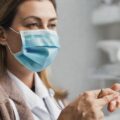Introduction
The COVID-19 pandemic has led to much fear and misinformation. However, we must face this challenge with compassion, wisdom and care for one another. This article will debunk some common myths without judgment, and offer perspective to bring more light.
Myth 1: COVID-19 Is Just Like the Flu
While both are infectious respiratory illnesses, COVID-19 has a higher risk of severe illness and complications. We must take appropriate precautions while supporting those impacted.
Myth 2: Masks Don’t Help
Research shows masks reduce transmission, especially when worn properly by all. Masks are an act of care towards others.
Myth 3: COVID Spreads Easily on Surfaces
Current evidence suggests person-to-person transmission is more common. We can take reasonable cleaning precautions without excess worry.
Myth 4: Children Can’t Get COVID-19
While their risk is lower, children can still get infected and spread the virus to others. Caring for children’s safety while avoiding fear is wise.
Myth 5: COVID Only Impacts the Elderly and Sick
While their risk is higher, COVID-19 can lead to severe illness at any age. We must protect the vulnerable without assuming anyone is immune.
Myth 6: Once You Recover, You’re Immune
Evidence on long-term immunity is still emerging. We can have hope while taking ongoing sensible precautions.
Myth 7: Vaccines Aren’t Safe
Leading vaccines have gone through rigorous safety testing. Getting vaccinated protects ourselves and others in an act of service.
Frequently Asked Questions
What are symptoms of COVID-19?
Common symptoms are fever, cough, fatigue, loss of taste/smell. Anyone with concerning symptoms should seek medical advice.
How exactly does COVID-19 spread?
It mainly spreads via respiratory droplets emitted when infected people cough, sneeze, sing, talk or breathe heavily near others.
Who’s most at risk of severe COVID-19 illness?
Elderly and those with underlying conditions like lung disease, heart disease, diabetes, cancer are higher risk. Obesity also increases risk.
How can I protect myself and others?
Get vaccinated, wear a mask in public, keep physical distance from others, avoid crowds, wash hands frequently, and get tested if you have symptoms.
What should I do if I think I have COVID-19?
Self-isolate immediately, even if symptoms are mild, and contact your healthcare provider for medical advice, including about getting tested.









